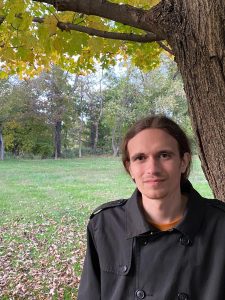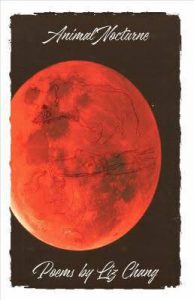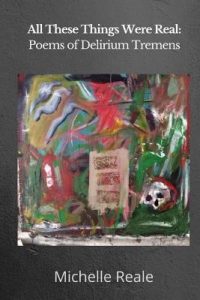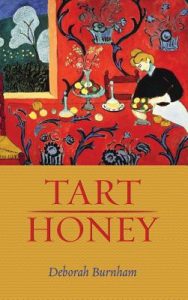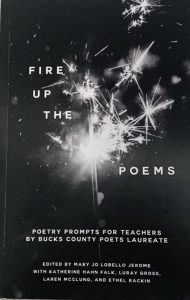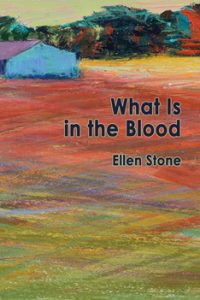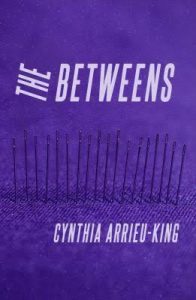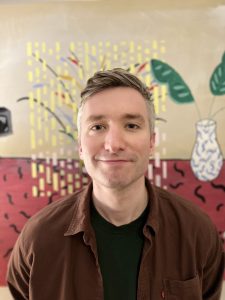
Do you need instructions? (Y/N)
>n
You wake up to yelling from downstairs, just like yesterday. You find your glasses on the nightstand and feel the world come back into focus. Your room has gotten progressively filthier since you arrived here. There was a point, only a few months ago, when you could still navigate the mess to find what you needed—deodorant, misplaced socks, the expensive calculator required for Trig. But now, five months in, anything that falls to the ground is as good as gone.
Beside you in bed is your laptop, still on from the night before. This might be the only object that will never be lost to the heap. You don’t know what you’d do without it.
> open laptop
The computer powers out of Sleep Mode. You lean in and study the screen, trying to remember where you left off.
Before you can read any further, you’re interrupted by more screaming from downstairs. “Are you awake?!”
> ignore
You turn back to the laptop and begin reading.
The game opens in a top-secret underground prison somewhere in the middle of Kansas. There’s a long description of how oppressive the room feels. The player doesn’t know why he’s been imprisoned—something about a shadowy organization of elites intent on world domination. You remember this being better.
You hear footsteps in the hallway, each one louder than the last. When they stop, Pop swings open the door. “You’re late!” He’s still yelling, even though you’re now in the same room. “What the hell are you waiting for?”
> say “i guess i overslept”
“I guess I overslept,” you say.
“Well, now you’re awake.” His voice is softer now, and more difficult to disregard. “Put on some clothes and grab some food.” As he walks back downstairs, you close the laptop, find your bookbag amidst the wreckage on the floor, and get dressed.
> go to the kitchen
Pop’s at the stove, cracking eggs over his cast-iron pan. “So what’s with this sleep pattern,” he says. It’s technically a question, but he delivers it as a statement. You’re not sure how to provide an answer. You’re not even sure he’s looking for one.
> say “i was writing”
“I was writing,” you say.
He cracks another egg. “You seem to think you can get through high school without sleep.”
Up until five months ago, you’d only spent time with Pop on holidays. It wasn’t that you’d disliked him; you hadn’t had any say in the matter. According to your mother, the family was toxic. Anathema. “My dad’s so judgmental,” she always said.
She wasn’t wrong about that. Since you began staying with Pop, he’s made it clear that you need to “shape up,” to “get to working,” to “get serious.” You nod every time he mentions these things, though you’re not sure if he really expects you to change. You’re sixteen. Part of you thinks he knows that you’re not actually listening.
“You need to focus on your schoolwork,” he says now, placing some runny eggs and dry toast in front of you. “And to be able to focus on your schoolwork, you need sleep.”
> eat quickly and head to the bus
You scarf down the plate in silence as Pop drones on about manhood and responsibility and “the defining moments in our lives.” With your mouth still full, you head for the door before he can start his daily lecture about steering clear of your Mom’s mistakes.
The yellow bus pulls up to the corner just as you arrive. As you board, you scan for open seats. Only two remain. There’s one in the back row, where the kids with vape pens sit and blow grape-scented rings, and then there’s the cramped space behind the driver.
> sit behind the driver and take out laptop
You take the seat behind the driver and open your laptop. Almost everyone on the bus is staring at a screen, but they’re watching their favorite YouTubers beg for subscriptions or listening to whiny songs about pharmaceuticals and heartbreak. But you, you’re different. You’re working.
You once tried to explain it all to a classmate, a shy kid with greasy hair you thought might be sympathetic, maybe even interested. It didn’t work.
“It’s a game?” he asked.
You nodded.
“But it’s only words?”
You knew elaborating would be pointless.
> open new doc
You open a new Doc and rack your brain for phrases you’ve heard over the last few days. You type “THE BORDERLINE” at the top of the page and stare at the way it sits against the white background. Your cursor blinks, like it’s taunting you to press Delete.
You ignore that impulse and instead try to imagine where the story might open. You try to imagine the options that would be offered to the player. You try to imagine the narratives that would arise from their choices, and the ones after those, and the ones after those. You start to get a bit dizzy, but you keep typing, hoping some of it will make more sense than whatever it was that you’d written the night before.
The bus pulls to a stop. You’ve arrived at school.
> hide
Sorry, I didn’t understand that request.
> hide under seat
Sorry, I didn’t understand that request.
> head to first period
Ms. Andrews is already starting the lesson when you arrive. “I want to give you some time to work on your memoir projects today,” she says as you settle into your desk. It’s an assignment the class started last week. You, however, haven’t written a word. Any minute that Ms. Andrews had allowed for in-class writing, you’d instead spent working on “THE FAMILY,” an adventure game about Giuseppe Crambino’s attempt to take his rightful place at the head of the Crambino Crime Syndicate. You’d been twenty rooms in when you realized you didn’t know anything about the mob. Demoralized, you’d pressed Ctrl+A and deleted the whole thing. The fifteen thousand words you’d written had suddenly vanished and were replaced by an unvarnished white space.
“Alright,” Ms. Andrews says, “let’s get to work!”
> open the borderline
You take out your laptop, power it back from Sleep Mode, and reopen the Doc containing “THE BORDERLINE.” You decide to avoid reading whatever you’d written on the bus. You want to focus on addition, not subtraction, so you begin typing whatever comes to mind. Character sketches, possible rooms, narrative webs—all of it could be valuable, so long as you can find the right place. At this point, the only goal is to try and keep your fingers moving as fast as your train of thought.
When you look up from your frantic typing, you realize Ms. Andrews is behind you. “Are you working on your memoir?” You know this is what she’d call a rhetorical question.
>lie
“Yes,” you say. You know it is not convincing.
She squats beside you, hovering just above the ground so she’s eye-level. “You know, your grandfather told me that this is an interest of yours. Honestly? I think it sounds pretty cool.” She’s smiling, but you can tell it’s forced. The whole thing feels like an act. You imagine Ms. Andrews and Pops in this classroom, sitting across from one another in comically small student desks, hatching this elaborate, pathetic plan to try and solve the problem that is your life.
>don’t respond
You don’t respond.
“You know, I used to play some of these games when I was a kid,” Ms. Andrews says. “Floppy disks. Do you know what those are?”
>say “yes”
“Yes,” you say.
“And what I remember about all of those games is that they’re so focused on storytelling. I mean, if you’re spending all your free time writing these games, then you must do a lot of writing.” She smiles. This is meant to be comforting. “It just makes me think that if you dedicate some of that effort towards the writing assignments for this class, then your grades will improve. I bet your games will get better, too.”
>don’t respond
You don’t respond.
“You know,” she says, lowering her voice so the other students won’t hear. “I really think an assignment like this one, where you’re asked to dive into your past, to sift through your memories, might be especially helpful for you.” She pauses. “I know you’ve been through a lot.”
What you want to say is that your writing has nothing to do with the past. It doesn’t follow a straight line backwards. It doesn’t follow any straight lines. No, your writing is concerned with the present. Your stories suggest that everything could suddenly change at any given moment, that nothing is ever truly fixed, that everything depends on your next move.
>say “can i use the bathroom”
“Can I use the bathroom?” you say. Ms. Andrews nods and moves on to the next student. You almost feel bad. She’s convinced that she’s finally broken through. She really believes you’re headed to the bathroom to have a good cry and throw some cold water on your face, that you’ll return to the room a new man, ready to exorcise all of your pain through the 750 word assignment.
>leave classroom with backpack
When Ms. Andrews begins working with another student, you grab your backpack and walk out the door. The restroom is to the east, a few hundred feet away. Ten feet to the west is an emergency exit you’ve seen teachers use for clandestine smoke breaks.
>take exit door to the west and walk off campus
You step outside the door, amazed by how much fresher the air feels. There were rumors that the school building was still rife with asbestos and now you’re certain they’re true.
You’re not too familiar with the neighborhood around school. You’ve never ventured off-campus for lunch like some of the older kids and you’ve never paid attention to street signs and landmarks on your bus ride in. That time’s always been dedicated to working on the next game.
>use gps on phone to find route home
You pull out your phone and type in Pops’ address. The app starts buffering, the circle icon spinning over and over again, asking you to just wait a little bit longer. As you’re staring, you feel someone approaching. You tell yourself not to panic, but you also begin thinking of plausible excuses for why you’re not in class.
“Do you remember me?” You look up to find an older woman. She’s smiling wide, exposing her unnaturally white teeth. “I was a friend of your mom’s.” She says this like it’s a good thing. You figure they must have fallen out of touch before everything happened.
“Okay,” you say. It comes out of your mouth without thinking. You hope it somehow sounds polite.
“How’s she been?” the woman says.
You don’t know how to answer the question. She’s wearing a navy pantsuit, the kind Mom wore years ago back when she was working the front desk at the law firm on the other side of the city. Maybe Mom knew this woman back then. Maybe this woman still works there. Maybe everyone at the law firm wears pantsuits, and smiles when they ask questions, and reaches the bare minimum of what qualifies as a “functioning adult.” As far as you can tell, the woman seems to have her life together. You wonder if she has kids at home. You wonder what they think of her. You wonder if they appreciate the fact that their mom is simply present, if they realize what a blessing it is to have a reliably boring parent capable of patience and self-control.
The woman’s smile turns to a concerned stare. “Are you all right?” she says.
> run
Where do you want to run?
> home
You turn away from the woman, in what you hope is the direction of Pops’ house. You start with a fast walk, but in just a few steps it turns into a jog. The woman is calling after you, wondering if she said something wrong, but you don’t respond. Soon enough, you’re sprinting, and the laptop in your bag bangs against your spine with every step.
After a few blocks, you stop to catch your breath. You’re hunched over, hands on your knees, panting as you stare at the sidewalk. When your pulse has finally returned to its normal pace, you take in the surroundings: you’re in front of the post office, across from the 4 Points Deli. Pops’ place is just a few minutes from here. You know he’ll be furious when he sees you at home, but you’re too tired to spend the day wandering around town. You’ll suck up your pride and nod along with his lecture, hoping that such obvious appeasement will stop him from throwing you in the car and delivering you back to Andrews’s English class.
When you enter the house, Pops is fast asleep on the living room couch. You realize you’ve never actually considered what he does all day while you’re at school. Observing him there, eyes shut tight and legs propped up on the armrest, you wonder why. His skin seems to be losing its pigment, exposing purple and blue veins that remind you of the human anatomy chapter in your Biology textbook. It’s easy to forget that he’s old enough to require a mid-morning nap, that taking you in is not something he’d planned for when he’d retired almost two decades earlier.
>go to bedroom
You quietly climb the stairs and return to your room. You lie down on the bed and open your laptop. “THE BORDERLINE” is still on the screen and you read the first few lines again, trying to put yourself back in the state-of-mind you’d found before Ms. Andrews had interrupted. But no matter how many times you re-read the opening, you can’t find the words to continue. You’re still thinking about Pops lying on the couch, about the smiling woman from the street, about the awkward way Ms. Andrews whispered, “I know you’ve been through a lot.”
You’re still thinking about Mom. You’re always thinking about Mom.
You close the file for “THE BORDERLINE” and re-open what you’d started last night: “LIKE SPEAKING IN MORSE CODE.” You highlight all of the story’s text, every description of that oppressive underground bunker and the player’s confusion at his situation, and press Delete. All that remains is the title, centered at the top of the Doc, waiting for direction.
“You wake up to yelling from downstairs,” you type, “just like yesterday.”
Kevin M. Kearney’s writing has appeared in Necessary Fiction, X-R-A-Y, Hobart, and elsewhere. He’s a fiction editor at Rejection Letters and a staff writer for PopMatters. He lives and teaches in Philadelphia. More of his work can be found at kevinmkearney.com.
